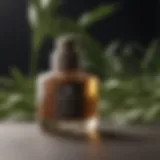The Ultimate Guide to Effective Over-the-Counter Acne Treatments


Beauty Trends
As we embark on the quest for clear and radiant skin, delving into the realm of over-the-counter (OTC) treatments for acne becomes a crucial step in our skincare journey. With a plethora of options available, navigating through the labyrinth of products can be overwhelming yet exciting. From potent formulations to gentle remedies, the world of OTC acne treatments offers a diverse range of solutions to address various skin concerns and types. To achieve luminous and blemish-free skin, it's essential to decode the best practices and ingredients that pave the way to a healthier complexion.
The Science Behind Acne
Before plunging into the plethora of options lining the shelves of beauty stores, it's imperative to understand the root causes of acne. Acne, a common skin condition, arises from the intricate interplay of factors such as sebum production, bacteria proliferation, and inflammation within the hair follicles. By comprehending the underlying mechanisms triggering acne formation, we can approach treatment with a holistic perspective, targeting not just the symptoms but also the fundamental processes contributing to skin breakouts. Educating oneself on the science behind acne empowers individuals to make informed choices when selecting OTC treatments geared towards resolving this prevalent dermatological concern.
Key Ingredients to Seek Out
As we embark on our journey to combat acne, a discerning eye towards the ingredients listed on skincare products can make a substantial difference in the effectiveness of the treatment. Ingredients such as benzoyl peroxide, salicylic acid, sulfur, and retinoids are renowned for their acne-fighting properties, each offering a unique mechanism of action to address pimples, blackheads, and blemishes. Understanding the role of these key ingredients and how they interact with the skin can guide us in selecting the most suitable OTC treatment tailored to our skin type and concerns. By deciphering the science behind these potent compounds, we equip ourselves with the knowledge necessary to craft an effective skincare regimen that targets acne at its core.
The Role of Skincare Routine
Incorporating OTC acne treatments into a comprehensive skincare routine amplifies their efficacy and ensures consistent results in the battle against breakouts. Establishing a regimen that encompasses cleansing, exfoliation, treatment, and moisturization creates a harmonious environment for these OTC products to thrive, maximizing their potential to combat acne effectively. By following a diligent skincare routine enriched with acne-fighting ingredients, individuals can cultivate healthy and radiant skin while keeping pesky pimples at bay. Embracing the art of skincare rituals elevates the efficacy of OTC treatments, ushering individuals towards a clearer and more confident complexion.
Mastering the Art of Consistency
As we navigate the realm of OTC treatments for acne, one cardinal rule stands paramount - consistency is key. Achieving lasting results in the fight against acne necessitates a steadfast commitment to skincare rituals and incorporating OTC products into daily routines with unwavering dedication. By embracing consistency in both application and regimen adherence, individuals nurture their skin with the care it deserves, paving the way for lasting transformation and renewed skin vitality. Embodying the virtues of consistency propels us towards healthier, blemish-free skin, transforming our skincare journey into a fulfilling and empowering experience.
Understanding Acne
In this comprehensive guide to the best over-the-counter (OTC) treatment for acne, understanding acne serves as the fundamental basis for effective skincare management. Acne, a common skin condition, can affect individuals of all ages, causing distress and impacting self-esteem. By delving into the intricacies of acne, we can identify the root causes, types of acne, and the psychological toll it may exert. This knowledge empowers individuals to make informed decisions regarding their skincare routine and product selection, leading to improved outcomes and increased confidence.
What Causes Acne?
The causes of acne are multifaceted, involving various factors such as excess sebum production, clogged pores, inflammation, and bacterial growth. Hormonal fluctuations, genetic predispositions, diet, and lifestyle choices also play significant roles in acne development. Understanding these causes helps individuals tailor their treatment approach, addressing specific underlying issues to effectively manage and prevent acne breakouts.
Different Types of Acne
Acne manifests in different forms, ranging from mild comedones to severe cysts and nodules. Common types include blackheads, whiteheads, papules, pustules, and nodules. Each type presents unique challenges and may require specific treatment strategies. Recognizing the differences in acne types enables individuals to target their skincare regimen towards tackling their specific acne manifestations, promoting clearer and healthier skin.
Impact of Acne on Mental Health
The impact of acne on mental health cannot be understated. Beyond physical symptoms, acne can have profound effects on self-image, confidence, and emotional well-being. Individuals with acne may experience feelings of embarrassment, insecurity, and social withdrawal. Addressing the psychological impact of acne is vital in comprehensive acne management, emphasizing the importance of holistic care that considers both the physical and emotional aspects of skin health.
Overview of Over-the-Counter (OTC) Acne Treatments


In this comprehensive article guiding you through the best Over-the-Counter (OTC) treatments for acne, delving deep into each aspect to provide clarity and guidance on managing acne effectively. The overview of OTC treatments holds significant importance, serving as a foundation for understanding how these accessible remedies can help address various types of acne concerns. By exploring the benefits, limitations, and the critical element of consistency in OTC treatment regimens, you will gain valuable insights into crafting a tailored approach to skincare that targets your specific needs.
Benefits of OTC Treatments
When considering Over-the-Counter (OTC) treatments for acne, it is essential to acknowledge the inherent benefits they offer. These treatments provide a convenient and cost-effective solution for individuals looking to address mild to moderate acne concerns without the need for a prescription. OTC products often contain active ingredients known to effectively combat acne, such as salicylic acid, benzoyl peroxide, and glycolic acid. Embracing OTC treatments can empower individuals to take control of their skincare routine and proactively manage acne symptoms with ease.
Limitations of OTC Treatments
Despite their advantages, Over-the-Counter (OTC) acne treatments also come with certain limitations that need to be considered. OTC products may not be potent enough to effectively treat severe or cystic acne, requiring medical intervention for optimal results. Additionally, some individuals may experience skin sensitivity or reactions to certain OTC ingredients, emphasizing the importance of patch testing before full application. Understanding these limitations can help individuals make informed decisions when selecting OTC treatments that align with their skincare goals.
Importance of Consistency in OTC Treatment
Consistency is key when embarking on an Over-the-Counter (OTC) acne treatment regimen. Establishing a regular skincare routine that incorporates OTC products allows for better efficacy and long-term management of acne symptoms. By sticking to a consistent application schedule and following recommended guidelines, individuals can maximize the benefits of OTC treatments and track their progress effectively. Maintaining consistency also enables the skin to adapt to the active ingredients present in OTC products, promoting clearer and healthier skin over time.
Key Ingredients to Look for in OTC Acne Treatments
In the realm of over-the-counter (OTC) acne treatments, selecting products with the right ingredients is crucial. These components play a pivotal role in tackling acne concerns effectively. By understanding the significance of each key ingredient, you can tailor your skincare routine to address your specific needs. Furthermore, being well-informed about these ingredients empowers you to make informed decisions when choosing OTC products to combat acne.
Salicylic Acid
Salicylic Acid is a prominent ingredient in many OTC acne treatments due to its exfoliating properties. This beta-hydroxy acid works by penetrating the pores to dissolve excess oil and dead skin cells, preventing clogging that leads to acne formation. Its anti-inflammatory characteristics also help in reducing swelling and redness associated with acne breakouts. When incorporating Salicylic Acid into your skincare regimen, it is essential to start with lower concentrations to prevent potential skin irritation while gradually increasing usage.
Benzoyl Peroxide
Benzoyl Peroxide is another key ingredient in OTC acne treatments known for its antibacterial properties. It effectively combats acne-causing bacteria and reduces oil production, making it beneficial for acne-prone skin. Benzoyl Peroxide also aids in unclogging pores and preventing future breakouts. However, it is essential to note that this ingredient may cause dryness and peeling, so hydrating the skin adequately is crucial when using products containing Benzoyl Peroxide.
Glycolic Acid
Glycolic Acid, an alpha-hydroxy acid, is renowned for its exfoliating and skin-renewing properties. It works by gently removing dead skin cells from the surface, promoting cell turnover and a brighter complexion. In addition to addressing acne concerns, Glycolic Acid can help improve the appearance of acne scars and hyperpigmentation. When integrating Glycolic Acid into your skincare routine, it is advisable to start with lower concentrations to gauge skin tolerance and prevent potential irritation.
Sulfur
Sulfur is a traditional remedy for acne known for its antibacterial and anti-inflammatory properties. It helps unclog pores, absorb excess oil, and reduce the growth of acne-causing bacteria. Sulfur is particularly suitable for individuals with sensitive skin as it tends to be gentler compared to other acne-fighting ingredients. However, some individuals may find the distinct scent of sulfur products off-putting. When using sulfur-based products, it is essential to follow the instructions carefully to maximize effectiveness and minimize potential side effects.
Choosing the Right OTC Acne Treatment
Choosing the right over-the-counter (OTC) acne treatment is a crucial step in addressing skincare concerns effectively. This section of the ultimate guide explores the nuances of selecting the most suitable OTC treatment tailored to individual needs and skin conditions.
When determining the optimal OTC acne treatment, various elements come into play, emphasizing the importance of thorough research and personalized consideration. Different OTC products cater to specific skin types and acne severities, making it essential to identify the most appropriate option for maximum efficacy. By delving into the nuances of each treatment, individuals can make informed decisions that align with their unique skincare goals.


The benefits of OTC treatments extend beyond mere acne management. They offer individuals the opportunity to take control of their skincare routine, promoting self-confidence and a sense of empowerment. By understanding the key components of OTC products and how they interact with different skin types, users can navigate the vast array of options with confidence and clarity.
Considering the broad spectrum of OTC acne treatments available, it is crucial to assess one's skin type and acne severity accurately. By analyzing these factors, individuals can narrow down their choices to select a treatment that targets their specific concerns effectively. Whether dealing with oily, dry, sensitive, or combination skin, identifying the appropriate product ensures a more tailored and beneficial skincare regimen.
Assessing Your Skin Type and Acne Severity
Assessing your skin type and acne severity plays a pivotal role in determining the most suitable over-the-counter (OTC) acne treatment for optimal results. The effectiveness of OTC products relies heavily on addressing individual skin needs and tailored solutions.
Skin type classification into categories like oily, dry, combination, or sensitive serves as a foundational step in selecting the right OTC treatment. Understanding one's skin characteristics guides the choice of products that complement and enhance the skin's natural balance. By evaluating factors such as oil production, moisture levels, and sensitivity, individuals can align OTC treatments with their skin's specific requirements.
In addition to skin type, assessing acne severity provides valuable insights into the intensity of the condition and the most appropriate course of action. By categorizing acne as mild, moderate, or severe, individuals can gauge the level of intervention necessary for effective treatment. This meticulous evaluation ensures a targeted approach that maximizes the benefits of OTC acne solutions.
Consulting with a Dermatologist
Consulting with a dermatologist is a prudent step in optimizing your over-the-counter (OTC) acne treatment plan. Dermatologists bring a wealth of expertise and specialized knowledge to the table, offering personalized insights that enhance the effectiveness of skincare regimens.
Professional dermatological consultations help individuals navigate the complexities of skincare, particularly when dealing with persistent or severe acne concerns. Dermatologists conduct thorough assessments of skin conditions, recommend tailored treatment options, and monitor progress over time. Their guidance ensures that OTC treatments are integrated seamlessly into a comprehensive skincare routine that promotes long-term skin health.
Engaging with a dermatologist also enables individuals to address any underlying skin issues that may exacerbate acne symptoms. Dermatological expertise uncovers hidden factors contributing to breakouts and empowers individuals with targeted solutions that go beyond surface-level treatment. By partnering with a dermatologist, individuals gain access to personalized care that optimizes the efficacy of OTC acne treatments.
Considering Combination Therapies
Incorporating combination therapies into your acne treatment plan can provide enhanced efficacy and comprehensive care for challenging skin conditions. By leveraging the synergies of different OTC products, individuals can target acne from multiple angles, promoting clearer and healthier skin.
Combination therapies often involve using complementary products that address distinct aspects of acne, such as inflammation, excess oil production, and bacterial growth. By combining treatments like salicylic acid cleansers, benzoyl peroxide spot treatments, and oil-free moisturizers, individuals create a multi-pronged approach that tackles acne at various stages of development.
Furthermore, combination therapies offer versatility in adapting to evolving skin needs. As skin conditions change over time, adjusting the combination of OTC treatments allows individuals to maintain efficacy and address emerging concerns effectively. This strategic approach to skincare fosters resilience against acne breakouts and promotes long-term skin health and vitality.
Incorporating OTC Acne Treatments into Your Skincare Routine
Cleansing and Exfoliation
When it comes to incorporating OTC acne treatments into your skincare routine, the first step is establishing a thorough cleansing and exfoliation process. Cleansing aids in removing impurities, excess oil, and debris from the skin, preventing pore congestion and acne formation. Selecting a gentle cleanser suited to your skin type is crucial to prevent irritation and maintain skin balance. Additionally, exfoliation helps slough off dead skin cells, unclog pores, and enhance the absorption of acne treatments. However, it is essential to exfoliate gently and not overdo it, as excessive exfoliation can irritate the skin and worsen acne symptoms. Finding the right balance in your cleansing and exfoliation routine is key to preparing your skin for the subsequent application of OTC acne treatments.
Application of OTC Products
The next critical aspect of incorporating OTC acne treatments into your skincare routine is the application of these products. Proper application techniques can significantly impact the effectiveness of acne treatments. Following the recommended guidelines for each product, such as the amount to use and frequency of application, is paramount to ensure optimal results. It is essential to apply OTC treatments evenly to the affected areas, avoiding excessive use that could lead to skin dryness or irritation. Patience is crucial during this stage, as visible improvements may take time to manifest. By mastering the art of applying OTC products correctly, individuals can harness their full potential in combating acne and achieving clearer skin.


Moisturizing and Sun Protection
The final key component of incorporating OTC acne treatments into your skincare routine is maintaining proper moisturizing and sun protection habits. While some acne treatments may cause dryness or skin sensitivity, a suitable moisturizer can help replenish hydration and support skin resilience. Opt for non-comedogenic moisturizers to avoid pore blockage and choose products that align with your skin's specific needs. Additionally, practicing sun protection is non-negotiable, as some acne treatments can increase skin photosensitivity. Utilize a broad-spectrum sunscreen daily, even on overcast days, to shield your skin from harmful UV rays and prevent post-inflammatory hyperpigmentation. By prioritizing moisturizing and sun protection in your skincare routine, you can nurture your skin's health while reaping the benefits of OTC acne treatments.
Monitoring Progress and Adjusting Your Treatment
In this pivotal section of our comprehensive guide to the best over-the-counter (OTC) treatment for acne, we delve into the crucial aspect of monitoring progress and adjusting your treatment regimen. Effectively tracking the changes in your skin and knowing when to switch treatments is paramount in achieving desired results and managing acne effectively. By incorporating patience and persistence, you can navigate the journey of acne treatment with confidence and precision.
Tracking Changes in Your Skin
Understanding the nuances of your skin and recognizing subtle changes are fundamental in assessing the effectiveness of your OTC acne treatment. By closely monitoring how your skin responds to different products and ingredients, you can make informed decisions on the efficacy of your current regimen. Factors such as changes in breakouts, skin texture, and overall complexion play a vital role in determining the success of your treatment plan.
Recognizing When to Switch Treatments
Knowing when it's time to switch or modify your OTC acne treatment is as crucial as selecting the right products initially. Signs such as persistent breakouts, worsening skin condition, or plateauing results indicate the need for a strategic adjustment in your skincare routine. Consulting with a dermatologist can provide valuable insights and guidance on transitioning to a more suitable treatment for your evolving skin needs.
Patience and Persistence in Acne Management
Patience and persistence are virtues that significantly impact the effectiveness of your acne management journey. Achieving clear and healthy skin takes time, and consistent adherence to your treatment plan is key. By setting realistic expectations and staying committed to your skincare regimen, you pave the way for long-term success in managing acne. Embracing a proactive and diligent approach can lead to tangible improvements and a more confident relationship with your skin.
Potential Side Effects and Precautions
Common Side Effects of OTC Acne Treatments
When considering OTC acne treatments, being aware of the common side effects can facilitate a smoother treatment experience. These treatments, while effective, may lead to skin dryness, redness, or irritation as your skin adjusts to new ingredients. It's essential to monitor any adverse reactions closely and consult a dermatologist if symptoms persist or worsen. By gaining a clear understanding of these typical side effects, individuals can better anticipate and address any challenges that may arise during treatment.
Precautionary Measures to Follow
To maximize the benefits of OTC acne treatments and minimize potential risks, following precautionary measures is paramount. Firstly, conducting a patch test before full application can help assess for any allergic reactions or sensitivities. Additionally, incorporating new products gradually into your skincare routine allows your skin to adapt without overwhelming it. It's also advisable to use sunscreen daily, as some acne treatments can increase skin sensitivity to sunlight. By adhering to these precautionary measures, individuals can support the effectiveness of their acne treatment while safeguarding their skin's health and integrity.
Conclusion
In concluding this comprehensive guide to the best Over-the-Counter (OTC) treatment for acne, it is essential to reflect on the key takeaways presented throughout the article. Understanding the significance of OTC treatments in managing acne, particularly for individuals facing occasional breakouts or persistent skin concerns, is crucial. By delving into the benefits, limitations, and key ingredients of OTC products, readers can make informed decisions about their skincare routine.
Highlighting the relevance of consistency in OTC treatment showcases its vital role in achieving effective outcomes. Incorporating these treatments into a daily skincare regimen requires diligence and patience but can lead to visible improvements in skin health over time. By emphasizing the importance of consulting with a dermatologist and considering individual skin types and acne severity, individuals can tailor their treatment plans to suit their specific needs.
Empowering oneself with OTC acne treatments involves recognizing the value of dedication to a skincare routine and being vigilant about monitoring progress. Patience and persistence are key attributes in acne management, as results may take time to manifest. By tracking changes in the skin, being proactive about adjusting treatments when necessary, and adhering to prescribed precautions, individuals can navigate the realm of OTC treatments with confidence and self-assurance.
Empowering Yourself with OTC Acne Treatments
Empowering yourself with OTC treatments for acne involves a multifaceted approach that integrates knowledge, consistency, and adaptability. By understanding the diverse range of OTC products available and their potential benefits, individuals can take charge of their skincare journey. Key considerations include the selection of suitable products based on skin type and the incorporation of proven ingredients like salicylic acid, benzoyl peroxide, glycolic acid, and sulfur.
Moreover, empowering oneself with OTC acne treatments requires a commitment to a skincare routine that includes cleansing, exfoliation, and proper application of products. Moisturizing and sun protection play crucial roles in maintaining skin health while undergoing acne treatment. Monitoring progress and remaining vigilant for any side effects or changes in skin condition are essential components of an effective acne management strategy.
By arming oneself with knowledge, patience, and the willingness to adapt as needed, individuals can harness the power of OTC acne treatments to achieve clearer, healthier skin. Empowerment through education and consistency paves the way for enhanced confidence and well-being in managing acne effectively.







